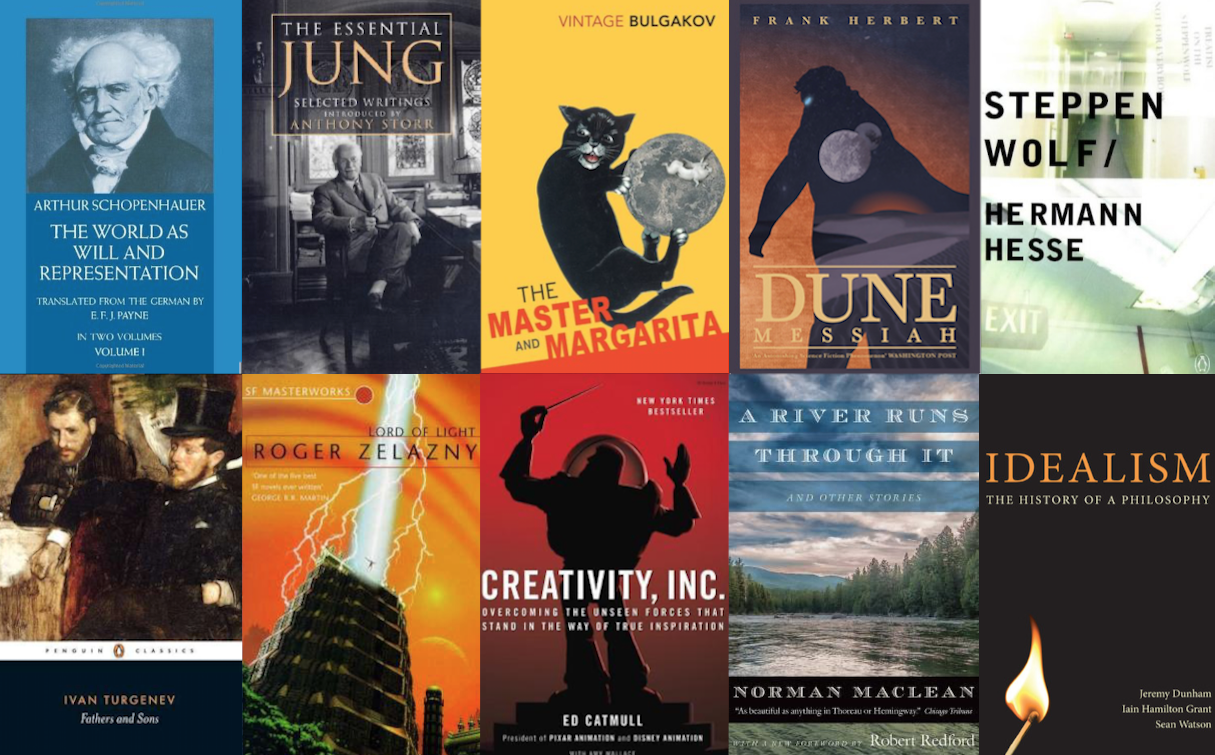My Top 10 Books of 2023

Here are my ten favourite books that I read in 2023.
1. The World as Will and Representation by Arthur Schopenhauer
The list of people inspired by Schopenhauer’s thought who have gone on to change our understanding of the world and ourselves, is long. He influenced figures like Einstein, Freud, Wittgenstein, and countless authors and artists. In order for this book to be fully understood and appreciated, however, it’s necessary that the reader experience in perception for themselves that the world manifests both as will and as representation.
“Finally, if we look at the province of natural science, which is divided into many fields, we can first of all distinguish two main divisions. It is either a description of forms and shapes, which I call Morphology; or an explanation of changes, which I call Etiology.”
2. The Essential Jung: Selected Writings by Carl Jung (edited by Anthony Storr)
This book is a collection of extracts from Jung’s numerous works on the contents of the unconscious, the nature of personality, and the problem of good and evil. Jung is a true physician of the soul.
“During those years, between 1918 and 1920, I began to understand that the goal of psychic development is the self. There is no linear evolution; there is only a circumambulation of the self. Uniform development exists, at most, only at the beginning; later, everything points towards the centre. This insight gave me stability, and gradually my inner peace returned. I knew that in finding the mandala as an expression of the self I had attained what was for me the ultimate.”
3. The Master and Margarita by Mikhail Bulgakov
There’s something about those Russians, in being able to pull off masterpieces like this one. It’s a story about the Devil and his gang who arrive into Moscow, and cause complete mayhem. The characters are extremely likeable, and the images depicted by Bulgakov’s writing are extraordinarily impressive. You have to read it to believe just how good it is.
“Night thickened, flew alongside, seized the riders’ cloaks and pulling them from their shoulders, unmasked their disguises.”
4. Dune Messiah by Frank Herbert
This book partly deals with the consequences of a protagonist with an expanded consciousness, and partly with the politics of empire. Its insights are numerous, such as the dark but entertaining conflict of wits between a shape-shifting villain, and the protagonist, Paul Atreides.
“There are many degrees of sight…”
5. Steppenwolf by Hermann Hesse
Informed by Jung’s metaphysics, Steppenwolf is a slow moving story about a protagonist who feels part man and part wolf. He has to eventually confront his inner demons, often leading to his existential isolation from his contemporaries.
“He came through the glazed door, having just rung the bell, and my aunt asked him in the dim light of the hall what he wanted. The Steppenwolf, however, first threw up his sharp, closely cropped head and sniffed around nervously before he either made any answer or announced his name. “Oh, it smells good here,” he said.”
6. Fathers and Sons by Ivan Turgenev
Written in the realist genre of literature, Turgenev explores themes like existentialism, nihilism, family, and friendship. Its descriptions of rural Russian life are vivid and memorable.
“A man’s capable of understanding anything - how the ether vibrates, and what’s going on in the sun - but how any other man can blow his nose differently from him, that he’s incapable of understanding.”
7. Lord of Light by Roger Zelazny
Zelazny takes the reader through descriptions of lush, green palaces where characters sit and contemplate as rain falls on ancient buildings, before he elevates them to the realm of gods, and bestows onto them knowledge old and new.
“As if by a carpet of magic, he transported them through the lands of illusion, raising up palaces of colored smoke upon pillars of water and of fire, escalating the benches at which they sat down canyons of stardust, striving with coral and myrrh to bend their senses beyond themselves, bringing onto them all their Aspects, where he held them, rotating about the archetypes upon which they based their powers…”
8. Creativity, Inc by Ed Catmull
Catmull provides a wide window behind the scenes of how the creative process at Pixar functions, and how, by constantly striving to make each other better, they stay true to and slowly build up the stories that speak to them.
“Craft is what we are expected to know; art is the unexpected use of our craft.”
9. A River Runs Through It by Norman Maclean
The audio narration of this book is mesmerising. It’s about the outdoors, fly-fishing, drinking beer, and the wisdom of the natural world.
“My father was very sure about certain matters pertaining to the universe. To him all good things––trout as well as eternal salvation––come by grace and grace comes by art and art does not come easy.”
10. Idealism: The History of a Philosophy by Jeremy Dunham, Iain Hamilton Grant and Sean Watson
While there’s no single understanding of ‘idealism’ in philosophy, broadly it’s the view that all that exists, are ideas, or perceptions, in the minds of observers. The term ‘idea’ also encompasses elements of the mind such as thought. The authors take a historical view on the subject, with the attempt to address the questions, (1) what governs the movement of cause and effect in the universe, (2) and how is it that nature has come to be filled with a multiplicity of objects.
“…Plato’s account of time as a ‘moving image of eternity’”.